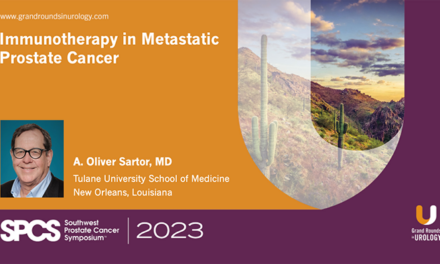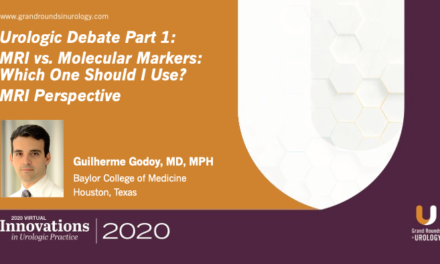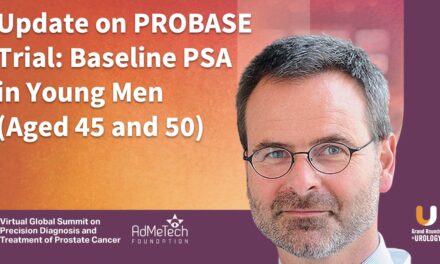Hao G. Nguyen, MD, PhD, presented “High Intensity Focused Ultrasound for Prostate Cancer” during the 29th Annual Perspectives in Urology: Point-Counterpoint, on November 19, 2021, in Coronado Island, San Diego, California.
How to cite: Nguyen, Hao G. “High Intensity Focused Ultrasound for Prostate Cancer.” November 19, 2021. Accessed Dec 2025. https://grandroundsinurology.com/high-intensity-focused-ultrasound-for-prostate-cancer/
High Intensity Focused Ultrasound for Prostate Cancer
Hao G. Nguyen, MD, PhD, Associate Professor of Urology at the University of California, San Francisco, reviews high intensity focused ultrasound (HIFU) for prostate cancer, discussing its basic principles, historical development, current role, and outcomes. He begins by describing HIFU as a non-invasive approach that uses precisely delivered ultrasound energy to a deep tumor necrosis while minimizing side effects, specifying that its success depends on careful patient selection and lifetime surveillance. Dr. Nguyen outlines the history of HIFU from the first prostate cancer treatment with HIFU at Lyon University Hospital in 1993, through 2022. He reviews the NCCN, AUA/ASTRO/SUO, EAU, and DGUS3 guidelines, all of which suggest that HIFU is an option for prostate cancer treatment, but not yet standard care. Dr. Nguyen discusses how focal therapy can work to fill an important treatment gap in prostate cancer, between active surveillance and radical therapy, due to the oncological control with minimal side effects that HIFU provides. He summarizes data on upgrade-free survival during active surveillance that found high rates of overall survival, prostate cancer specific survival and metastases-free survival. Dr. Nguyen also considers data on the role of focal therapy in active surveillance which demonstrates that 70% of FT candidates remain favorable for hemiablation based on biopsy. He then discusses four ways that HIFU can fail: the heat-sink effect wherein cancer vessels wash heat in or away; the margin effect which signals a missed satellite cancer area; the staging effect wherein micromets or clinically significant cancer is missed; and the field effect which is the progression of low-risk cancer or a pre-cancerous area. Dr. Nguyen concludes that HIFU has promising oncological data and could be shown to be an effective option for patients who don’t want active surveillance or radical therapy.
About the 29th Annual Perspectives in Urology: Point Counterpoint conference:
Presented by Program Chair and Grand Rounds in Urology Editor-in-Chief E. David Crawford, MD, this conference brought together leading experts in urology, medical oncology, and radiation oncology to discuss and debate the latest topics in genitourinary cancers, primarily prostate cancer and bladder cancer. This interactive conference offered topical lectures, pro/con debates, interesting-case presentations, interactive panel discussions, and interactive audience and faculty networking.
ABOUT THE AUTHOR
Hao Nguyen, MD, PhD, is Associate Professor in Residence of Urologic Oncology and holds the Richard and Leilani Grinold Endowed Professorship in Urology at the University of California, San Francisco. Dr. Nguyen received his undergraduate training from UC Berkeley, where he earned a degree in molecular cell biology in 1999. He received the Dean Scholarship from Boston University School of Medicine to join their Department of Biochemistry and Molecular Medicine MD-PhD program. He was awarded first prize for his PhD dissertation work investigating the role of defective chromosome segregation underlying cancer initiation. In 2007, he concurrently earned an MD from the School of Medicine. He completed his General Surgery and Urologic Surgery training at the University of California, Davis, and subsequently continued at UCSF to complete a fellowship in Urologic Oncology. At the end of his fellowship, Dr. Nguyen was recruited to join the UCSF Department of Urology, specializing in Urologic Oncology. He is part of the multidisciplinary urologic oncology team of the UCSF Helen Diller Family Comprehensive Cancer Center, located at Mission Bay. Dr. Nguyen’s clinical interests include the early detection, diagnosis, and management of prostate cancer, kidney cancer, bladder cancer, and other genitourinary malignancies. He performs open, robotic, laparoscopic, and endoscopic surgeries. He is particularly interested in focal therapies to treat early-stage prostate cancer, MRI fusion biopsy, and using novel biomarkers and imaging technology in risk-stratifying prostate, renal, and bladder cancer.
Dr. Nguyen has authored over 70 peer-reviewed scientific articles and book chapters. His primary research focus is in elucidating the adaptive response pathways that prostate cancer cells use to evade cell death upon acquiring oncogenic lesions/stresses or even when they are under the selective pressure of chemotherapy or radiotherapy. He has been awarded the prestigious Department of Defense Physician Training Grant, the PCF Young Investigator Award, and the 2017 AUA-Urology Care Foundation Rising Star in Research Award. In 2020, Dr. Nguyen was awarded a $1 million Challenge Award from the Prostate Cancer Foundation and received the Benioff Initiative for Prostate Cancer Research grant to uncover novel molecular therapeutic targets for the treatment of metastatic prostate.




